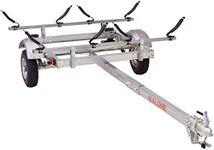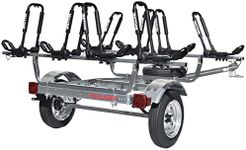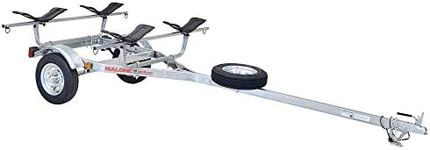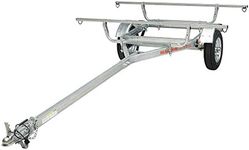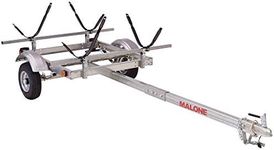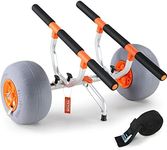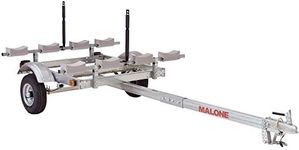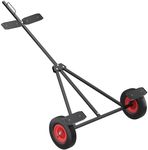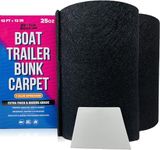Buying Guide for the Best Kayak Trailer
Choosing the right kayak trailer can make transporting your kayak much easier and more efficient. When selecting a kayak trailer, it's important to consider several key specifications to ensure that it meets your needs and preferences. Understanding these specifications will help you make an informed decision and find the best fit for your kayaking adventures.Weight CapacityWeight capacity refers to the maximum weight that the trailer can safely carry. This is important because it ensures that the trailer can handle the weight of your kayak(s) and any additional gear you may need to transport. Trailers with lower weight capacities (up to 200 lbs) are suitable for single kayaks and light gear, while those with higher capacities (200-500 lbs) can accommodate multiple kayaks or heavier equipment. Choose a trailer with a weight capacity that matches or exceeds the total weight of your kayak(s) and gear to ensure safe and efficient transport.
Trailer Size and DimensionsThe size and dimensions of the trailer determine how many kayaks it can carry and how easily it can be stored or maneuvered. Smaller trailers are more compact and easier to store, making them ideal for single kayaks or limited storage space. Larger trailers can carry multiple kayaks and offer more space for gear but may require more storage space and be more challenging to maneuver. Consider the number of kayaks you need to transport and the available storage space when choosing the trailer size and dimensions.
Material and Build QualityThe material and build quality of the trailer affect its durability, weight, and resistance to weather conditions. Common materials include steel and aluminum. Steel trailers are strong and durable but can be heavier and prone to rust if not properly maintained. Aluminum trailers are lightweight, resistant to rust, and easier to handle but may be less durable under heavy loads. Choose a trailer made from a material that balances durability and weight according to your needs and the conditions in which you will be using it.
Tire Type and SizeThe type and size of the tires on the trailer impact its stability, ease of towing, and performance on different terrains. Larger tires provide better stability and can handle rough or uneven terrain more effectively, making them suitable for off-road or long-distance travel. Smaller tires are lighter and more suitable for smooth, paved roads. Consider the type of terrain you will be traveling on and choose tire size and type accordingly to ensure a smooth and stable ride.
Hitch CompatibilityHitch compatibility refers to the type of hitch required to attach the trailer to your vehicle. It's important to ensure that the trailer's hitch is compatible with your vehicle's hitch receiver. Common hitch sizes include 1.25-inch and 2-inch receivers. Check your vehicle's hitch specifications and choose a trailer with a compatible hitch to ensure a secure and safe connection.
Storage and Folding FeaturesSome kayak trailers come with storage and folding features that make them more convenient to use and store. Folding trailers can be collapsed for easy storage when not in use, making them ideal for those with limited storage space. Additionally, trailers with built-in storage compartments or racks can help organize and secure your gear during transport. Consider these features if you need a compact storage solution or additional storage options for your gear.
